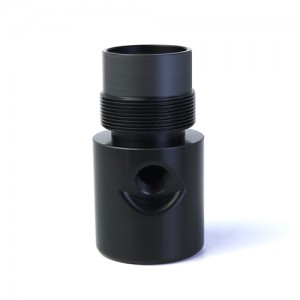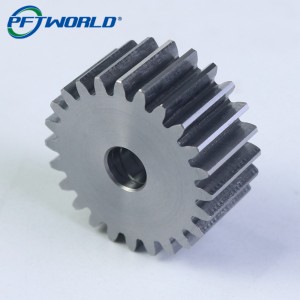• High-volume plastic parts (500k+ cycles)
Tool Steel D2 Machining for Injection Molds
Product Overview
If you're working with injection molds, you've probably heard of D2 tool steel– the workhorse of durable mold materials. But machining this beast isn't for the faint-hearted. Let me walk you through the real-world challenges and solutions for working with D2, straight from the shop floor.
Why D2 Steel Dominates Injection Mold Making
D2 isn't just another tool steel – it's the gold standard for molds that need to last. Here's why:
✔ Exceptional wear resistance (Chromium carbides make it 3x tougher than P20)
✔ Good dimensional stability (Holds tight tolerances under heat)
✔ Decent polishability (Can achieve SPI A1/A2 finishes)
✔ Balanced cost (More affordable than premium steels like H13)
Typical Applications:
• Abrasive materials like fiber-filled resins
• Tight-tolerance medical components
• Automotive under-the-hood parts
Proven Machining Strategies That Actually Work
1.Cutting Tools That Survive D2
• Carbide end mills with TiAlN coating (AlCrN works too)
• Positive rake geometry (reduces cutting forces)
• Variable helix designs (prevents chatter)
• Conservative corner radii (0.2-0.5mm for finishing)
2.Tool Life Hack
Reduce surface speed by 20% compared to P20 steel. For hardened D2, stay around 60-80 SFM with carbide tools.
EDM'ing D2: What the Manuals Don't Tell You
When you hit that hardened state, EDM becomes your best friend:
1.Wire EDM Settings
• Slower than cutting P20 by about 15-20%
• Expect more recast layer (plan for additional polishing)
• Use skim cuts for better surface finish
2.Sinker EDM Tips
• Graphite electrodes work better than copper
• Multiple electrodes (roughing/finishing) extend life
• Aggressive flushing prevents arcing
Polishing D2 to Perfection
Achieving that mirror finish requires:
• Start with proper machining/EDM finish (Ra < 0.8μm)
• Step through abrasives systematically (400 → 600 → 800 → 1200 grit)
• Use diamond paste for final polish (3μm → 1μm → 0.5μm)
• Directional polishing (follow material grain)
The Future of D2 Mold Making
Emerging trends to watch:
• Hybrid machining (combining milling and EDM in one setup)
• Cryogenic machining (extends tool life 3-5x)
• AI-assisted parameter optimization (real-time adjustments)


We are proud to hold several production certificates for our CNC machining services,which demonstrates our commitment to quality and customer satisfaction.
1、ISO13485:MEDICAL DEVICES QUALITYMANAGEMENT SYSTEM CERTIFICATE
2、ISO9001:QUALITY MANAGEMENT SYSTEMCERTIFICATE
3、IATF16949、AS9100、SGS、CE、CQC、RoHS
Positive feedback from buyers
• Great CNCmachining impressive laser engraving best Ive everseensofar Good quaity overall,and allthe pieces were packed carefully.
• Excelente me slento contento me sorprendio la calidad deias plezas un gran trabajo This company does a really nice job on quality.
• If there is an issue they are quick to fix itVery good communication and fast responise times. This company always does what I ask.
• They even find any errors that we may have made.
• We have been dealing with this company for a number of years and have always recelved exemplary service.
• I am very pleased with the outstanding quality or mynew parts.The pnce is very competiive and the custo mer service is among the best Ive ever experienced.
• Fast tumaround rabulous quality,and some of the best customer service anywhere on Earth.
FAQ
Q:How fast can I receive a CNC prototype?
A:Lead times vary depending on part complexity, material availability, and finishing requirements, but generally:
• Simple prototypes: 1–3 business days
• Complex or multi-part projects: 5–10 business days
Expedited service is often available.
Q:What design files do I need to provide?
A:To get started, you should submit
• 3D CAD files (preferably in STEP, IGES, or STL format)
• 2D drawings (PDF or DWG) if specific tolerances, threads, or surface finishes are required
Q:Can you handle tight tolerances?
A:Yes. CNC machining is ideal for achieving tight tolerances, typically within:
• ±0.005" (±0.127 mm) standard
• Tighter tolerances available upon request (e.g., ±0.001" or better)
Q:Is CNC prototyping suitable for functional testing?
A:Yes. CNC prototypes are made from real engineering-grade materials, making them ideal for functional testing, fit checks, and mechanical evaluations.
Q:Do you offer low-volume production in addition to prototypes
A:Yes. Many CNC services provide bridge production or low-volume manufacturing, ideal for quantities from 1 to several hundred units.
Q:Is my design confidential?
A:Yes. Reputable CNC prototype services always sign Non-Disclosure Agreements (NDAs) and treat your files and intellectual property with full confidentiality.












